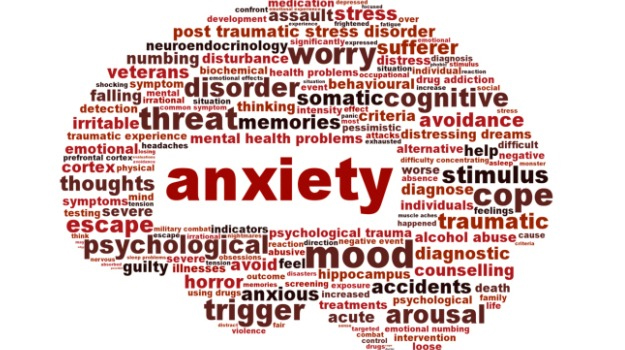Pathankot City


The National Institute of Mental Health offers more information about anxiety disorders.
Under “Health & Education,” the website describes these signs and symptoms of generalized anxiety disorder, or GAD:
People with GAD can’t seem to get rid of their concerns, even though they usually realize that their anxiety is more intense than the situation warrants. They can’t relax, startle easily and have difficulty concentrating. Often they have trouble falling asleep or staying asleep. Physical symptoms often include fatigue, headaches, muscle tension, muscle aches, difficulty swallowing, trembling, twitching, irritability, sweating, nausea, lightheadedness, having to go to the bathroom frequently, hot flashes and feeling out of breath.
GAD develops slowly. It often starts during the teen years or young adulthood. Symptoms may get better or worse at different times, and often are worse during times of stress.
When their anxiety level is mild, people with GAD can function socially and hold down a job. Although they don’t avoid certain situations as a result of their disorder, people with GAD can have difficulty carrying out the simplest daily activities if their anxiety is severe.
As for obsessive-compulsive disorder, the institute says that people with this condition generally have repeated thoughts or images about things such as germs, dirt or intruders; acts of violence; hurting loved ones; sexual acts; conflicts with religious beliefs; or being overly tidy.\
In addition, some people with OCD:
– Do the same rituals over and over, such as washing hands, locking and unlocking doors, counting, keeping unneeded items or repeating the same steps again and again.
– Can’t control their unwanted thoughts and behaviors.
– Don’t get pleasure when performing those behaviors or rituals, but do get brief relief from the anxiety that the thoughts cause.
– Spend at least an hour a day on the thoughts and rituals, which cause distress and get in the way of daily life.
Ways to help
Mental Health First Aid, a program coordinated by the National Council for Behavioral Health and the Maryland and Missouri health departments, is an eight-hour course that gives people the skills to help someone who is developing a mental health problem or experiencing a mental health crisis.
Myth vs. reality
The Anxiety and Depression Association of America has compiled a list of myths about anxiety with an accompanying reality check at its website at aada.org. (Click on “understanding the facts.”)
Copyright © 2024 About Pathankot | Website by RankSmartz ( )
)